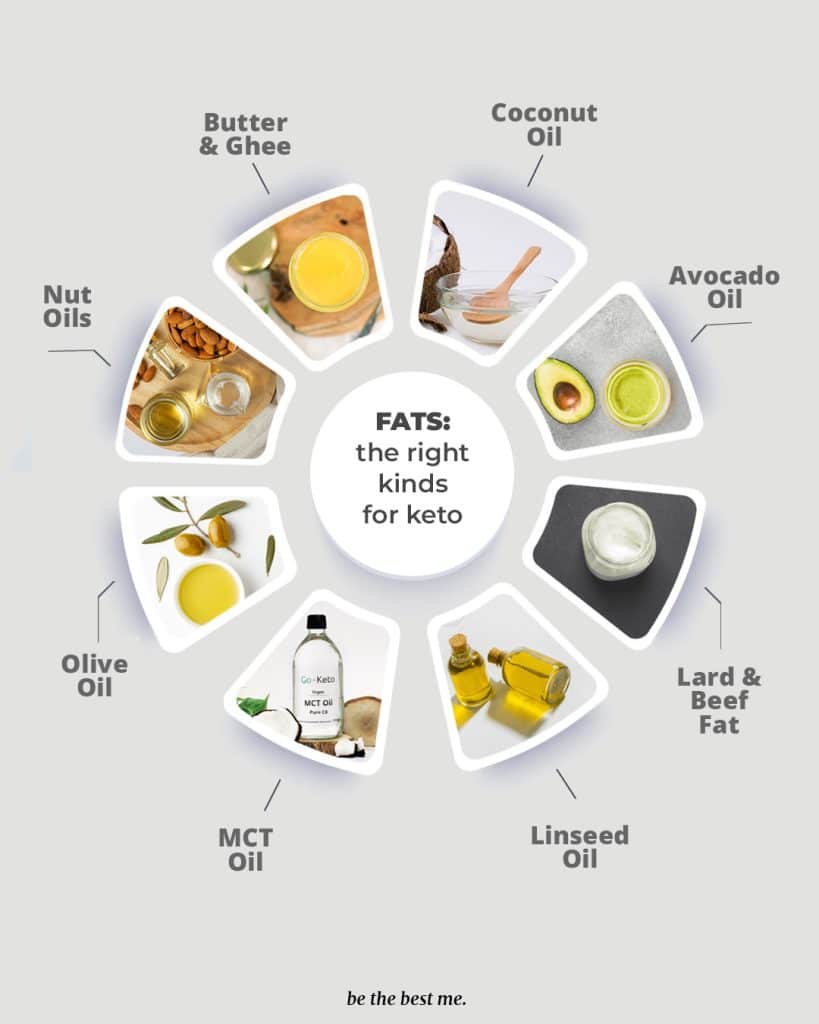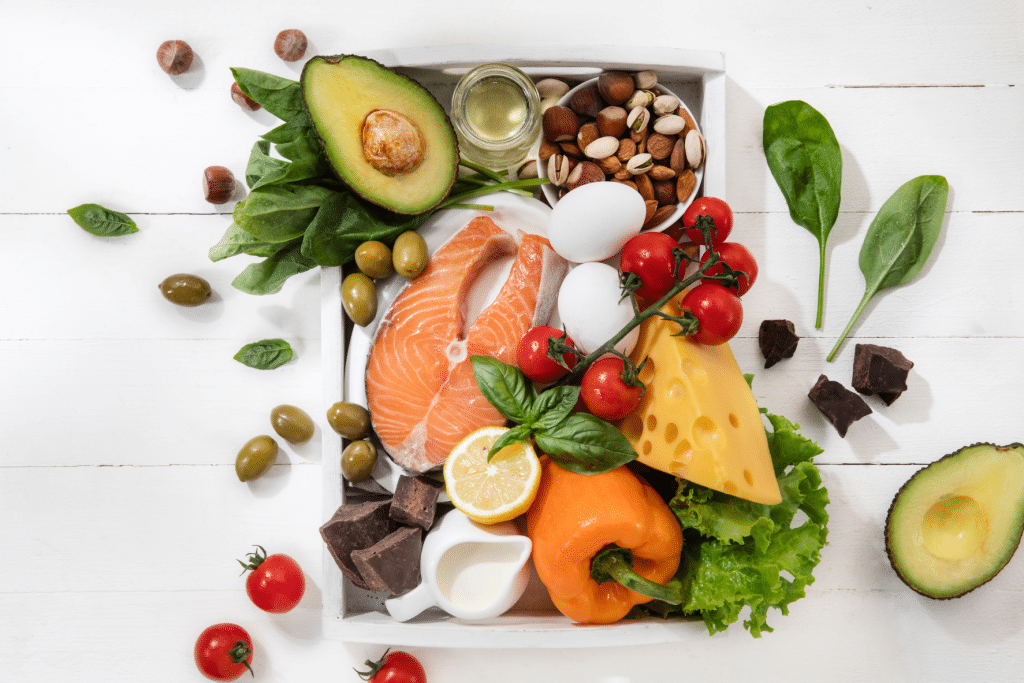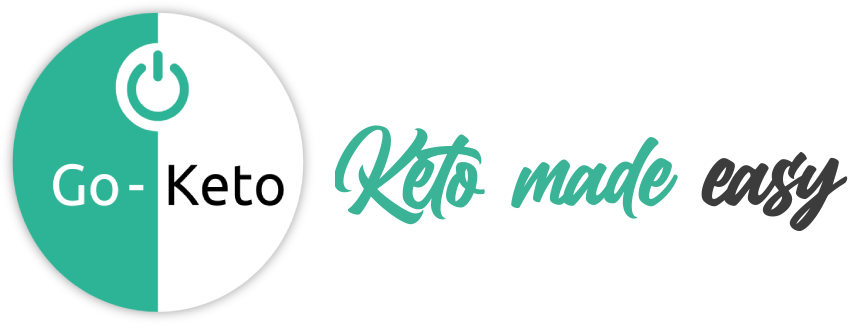Fat is of prime importance in the keto diet. By minimizing your carb intake and getting about 70% of your calories from fat, you train your body to turn the fat into ketones. Instead of carbs, these ketones become your primary source of energy – you’re in ketosis. There are lots of fats to choose from. The best types support your health and will actually promote ketosis. So which fats are best for keto?
Essentially, there are three sorts of consumable fat or fatty acids. The classification is based on the molecule structure of the fatty acid in question.
Types of Fat
- Saturated fat
- Monounsaturated fat
- Polyunsaturated fat
Each of these types can be great for your keto diet. Keep in mind that food always contains more than one type of fat. Red meat, for instance, contains both saturated and monounsaturated fatty acids and even some polyunsaturated fat.
The Best Saturated Fat Sources for Keto

1. MCT Oil
This is the best fat for ketone production. Instead of being first transported through the blood stream, MCT’s (Medium Chain Triglycerides) go straight to your liver to be converted into ketones. That’s why they supply your body with ketone energy faster than any other sort of fat. MCT’s are essential to the keto lifestyle.
MCT Oil can be produced from either palm kernel oil or coconut oil, but since palm agriculture is far from sustainable, MCT oil from coconut is usually preferred.
Use: on its own for an energy boost, for bulletproof coffee, in drinks, shakes and with salad
Unsuitable for: use at high temperatures; cooking; frying etc.
2. Ghee
Ghee is purified butter that behaves much like coconut oil and tastes like butter; just a bit nuttier. Although it’s technically dairy-based, it is clarified to the extent that it’s considered lactose free. Its greatest advantage over butter is that it can be used at very high temperatures without going black or bitter.
Use: very suitable for (stir)frying and even deep frying, Asian and Indian cooking, baking, ‘buttering’ (keto) bread
Unsuitable for: salad dressings etc.
3. Coconut Oil
Coconut oil naturally contains MCT’s and it’s from coconut oil that the best type of MCT Oil is produced. It is solid at room temperature. It doesn’t necessarily have a coconut flavour, since it’s also available in refined, odourless varieties. Extra Virgin is the best quality.
Use: very suitable for (stir)frying at high temperatures, Asian and Indian cooking, baking
Unsuitable for: cold dishes, salad dressings, mayonnaise etc.
Foods Rich in Saturated Fat: use in moderation

The following foods are rich sources of saturated fat. While saturated fat is not incompatible with the keto lifestyle, it is recommended to use saturated fat with moderation and make sure you get lots of mono- and polyunsaturated fat as well. Here’s what you need to keep in mind.
Full fat dairy: butter, cream and cheese
These are generally considered keto-friendly, but always make sure that they’re full fat and low in carbs – some cheeses, for instance, can be real carb bombs. This group of foods, especially cheese and yoghurt, may also contain large amounts of protein, e.g. casein, which you may want to limit, since your body will turn them into carbs if there is a surplus.
Meat: beef, lamb and pork
Unless your lifestyle is vegan or vegetarian, most meat, including its fat, has its place in your keto lifestyle, provided that you use it moderately. Too much red meat is not considered healthy; it’s high in saturated fat and too much protein may spike blood sugar levels.
Avoid so-called ‘dirty keto’ and opt for fresh, unprocessed and preferably organic meat. Ready-made, processed meat product such as burgers and sausages often contain added carbs. Moreover, these products usually also contain lots of preservatives, colorants and other artificial additives, making them a poor choice for healthy eating.
The Best Monounsaturated Fat Sources for Keto
Monounsaturated fats are the types of fat that have long been considered healthy and are staple food in the Mediterranean diet. Ketonians thrive on them as well.
Avocado and Avocado Oil
Because of its great taste and texture as well as its wonderful fat-carb ratio and nutritional values, avocado is well-established as keto’s favourite veggie – although technically, it’s fruit. A very special type of fruit, because unlike the majority of fruit, avocado contains a large amount of oil consisting largely of monounsaturated fat. Heating will ruin the subtle taste of avocado and worse, cause the oil to oxidize which renders it unhealthy.
Use: avocado and avocado oil need to be used cold: in salads, mayonnaise and salsa’s – guacamole, yeay!
Unsuitable for: heating, frying, baking
Extra Virgin Olive Oil
Appreciated throughout the ages for its wonderful taste and versatility, olive oil is at the core of Mediterranean cuisine. It’s generally considered one of the healthiest fats for cooking. It comes in many flavours, depending on where and how it is produced, so it pays to find out which type you like best for what dish.
The unrefined, cold-pressed variety known as extra virgin olive oil has the strongest taste when used cold but can be heated up to ca. 210 °C, the so-called smoke-point. At higher temperatures the taste deteriorates and the risk of oxidation sets in.
So while extra virgin olive oil is eligible for most cooking and light frying, it’s better to use a refined olive oil for deep frying, stir-frying and searing.
Use: as dressing for salad and vegetables and any food eaten cold, sauces and mayonnaise, cooking under ca. 210 °C
Unsuitable for: deep frying, stir-frying and searing (for these, better use refined olive oil)
Nuts and Nut Oil
Most nuts are quite rich in monounsaturated fats and many of them, as well as the oil extracted from them, are suitable for keto. There’s one notable exception: cashews, which are high in carbs.
These nuts and nut oils best suited to the keto lifestyle:
- Macadamia and Macadamia Nut Oil
- Pecans
- Almonds and Almond Oil
- Walnuts and Walnut Oil
- Brazil Nuts
Use: snacks, cooking (nuts), over salad and vegetables and any food eaten cold (nut oil)
Unsuitable for: heating (nut oil)
The Best Polyunsaturated Fat Sources for Keto
Among the polyunsaturated fatty acids, the most important types for your health are the Omega-3 fatty acids, especially DHA and EPA, which have a number of scientifically proven and ESFA-authorized health benefits [3].
DHA and EPA support:
- Heart function (250mg DHA/EPA per day)
- Brain function (250mg DHA per day)
- Healthy blood pressure (3g per day)
- Healthy blood triglyceride values (2g DHA/EPA per day)
- Normal vision (250mg DHA per day)
You also need fats from the other class of polyunsaturated acids, the Omega-6 fats. Both Omega -3 and Omega-6 are considered essential: you can’t do without them but your body can’t produce them, so you need to get them from food.
However, too much Omega-6 in relation to Omega-3 is not recommended for a healthy fat intake; the amounts should be about equal. Omega-6 polyunsaturated acids can be found in meat as well as many vegetable oils, nuts and seeds.
In practice, getting enough Omega-6 isn’t a problem, least of all if you’re on keto, so it’s recommended that you focus on your Omega-3 DHA and EPA intake.
The Best Polyunsaturated Fat Sources for Keto
Fatty Fish and Seafood
Eating a good portion of fatty fish at least once a week is the best way to secure your Omega-3 intake through food.
These fish contain the largest amounts of DHA/EPA:
- Mackerel
- Herring
- Salmon
- Anchovies
- Oysters
However, don’t overdo it. Keep in mind that some fish may be polluted with toxins and heavy metals. Also, don’t forget that there’s a sustainability issue if you eat large amounts of fish.
Eggs
Besides fatty fish, very few foods contain significant amounts of DHA/EPA. Eggs, which are staple food in many keto nutrition plans because of their ideal low-carb and nutritional properties, are an exception. Just make sure to eat the whole egg, since most of its fatty acids are found in the yolk. Incidentally, eggs are also a great source of the much-needed Vitamin D.
Omega-3 supplements (Fish Oil or Krill Oil)
Supplements? Yes. Because let’s face it, fatty fish is not everybody’s favourite food and many people fail to meet the required intake. If that’s the case, a well-chosen, pure Omega-3 supplement can be a perfectly good, healthy and sustainable way of making sure that you get the fat that you need. It’s best to opt for a pure and clean, sustainably fished fish oil with the recommended dose of DHA and EPA. Or better yet, go for Krill Oil.
Krill Oil is often preferred for these reasons:
- It’s more easily absorbed than fish oil
- Unlike fish oil, it does not cause fishy belches
- It contains Astaxanthin, a strong antioxidant
- It’s extremely clean: krill is a tiny shrimp from the Antarctic, the world’s cleanest ocean.
At Go-Keto, we offer a highly effective Krill Oil supplement of the best possible quality. Check out our Go-Keto Krill Oil Omega-3.
And What About My Cholesterol?

Beginning ketonians often worry that the high fat intake of the keto diet will spike their cholesterol levels and compromise their cardiovascular health. After all, we’ve long been warned against eating fatty food for this reason.
However, medical insights have changed in recent years, plus there’s the growing evidence from many healthy ketonians to go by.
First, let’s emphasize once more that it’s important that you get the right kinds of fat: saturated fat in moderation and as wide range of healthy mono- and polyunsaturated fats as possible.
Provided that the fats are of the right kind, the general consensus is that in the majority of cases, the keto diet poses no threat to cholesterol levels and may even be beneficial for raising ‘good’ cholesterol.
However, it’s always advisable to check with your physician when making dietary and lifestyle changes like committing to keto.
Interested? Read more on this subject in this article: What is Dietary Cholesterol? | How do I Reduce my Cholesterol?
Medical Disclaimer: The information reflected in this article is intended for educational purposes only. Please consult your physician or medical specialist before making any major adjustments to your diet.
———————————————————————
1. Siri-Tarino, P. W., Sun, Q., Hu, F. B., & Krauss, R. M. (2010). Meta-analysis of prospective cohort studies evaluating the association of saturated fat with cardiovascular disease. The American journal of clinical nutrition, 91(3), 535–546.
2. de Souza, R. J., Mente, A., Maroleanu, A., Cozma, A. I., Ha, V., Kishibe, T., Uleryk, E., Budylowski, P., Schünemann, H., Beyene, J., & Anand, S. S. (2015). Intake of saturated and trans unsaturated fatty acids and risk of all cause mortality, cardiovascular disease, and type 2 diabetes: systematic review and meta-analysis of observational studies. BMJ (Clinical research ed.), 351, h3978.
3. https://efsa.onlinelibrary.wiley.com/doi/pdf/10.2903/j.efsa.2010.1796




